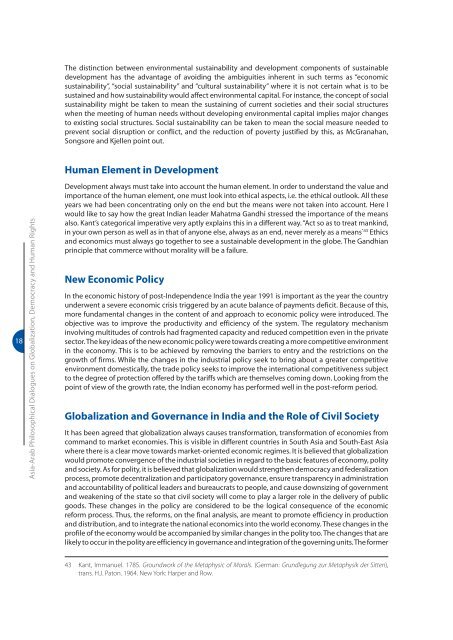Asian-Arab philosophical dialogues on globalization, democracy ...
Asian-Arab philosophical dialogues on globalization, democracy ...
Asian-Arab philosophical dialogues on globalization, democracy ...
You also want an ePaper? Increase the reach of your titles
YUMPU automatically turns print PDFs into web optimized ePapers that Google loves.
The distincti<strong>on</strong> between envir<strong>on</strong>mental sustainability and development comp<strong>on</strong>ents of sustainable<br />
development has the advantage of avoiding the ambiguities inherent in such terms as “ec<strong>on</strong>omic<br />
sustainability”, “social sustainability” and “cultural sustainability” where it is not certain what is to be<br />
sustained and how sustainability would affect envir<strong>on</strong>mental capital. For instance, the c<strong>on</strong>cept of social<br />
sustainability might be taken to mean the sustaining of current societies and their social structures<br />
when the meeting of human needs without developing envir<strong>on</strong>mental capital implies major changes<br />
to existing social structures. Social sustainability can be taken to mean the social measure needed to<br />
prevent social disrupti<strong>on</strong> or c<strong>on</strong>flict, and the reducti<strong>on</strong> of poverty justified by this, as McGranahan,<br />
S<strong>on</strong>gsore and Kjellen point out.<br />
Human Element in Development<br />
18<br />
Asia-<str<strong>on</strong>g>Arab</str<strong>on</strong>g> Philosophical Dialogues <strong>on</strong> Globalizati<strong>on</strong>, Democracy and Human Rights<br />
Development always must take into account the human element. In order to understand the value and<br />
importance of the human element, <strong>on</strong>e must look into ethical aspects, i.e. the ethical outlook. All these<br />
years we had been c<strong>on</strong>centrating <strong>on</strong>ly <strong>on</strong> the end but the means were not taken into account. Here I<br />
would like to say how the great Indian leader Mahatma Gandhi stressed the importance of the means<br />
also. Kant’s categorical imperative very aptly explains this in a different way. “Act so as to treat mankind,<br />
in your own pers<strong>on</strong> as well as in that of any<strong>on</strong>e else, always as an end, never merely as a means ”.43 Ethics<br />
and ec<strong>on</strong>omics must always go together to see a sustainable development in the globe. The Gandhian<br />
principle that commerce without morality will be a failure.<br />
New Ec<strong>on</strong>omic Policy<br />
In the ec<strong>on</strong>omic history of post-Independence India the year 1991 is important as the year the country<br />
underwent a severe ec<strong>on</strong>omic crisis triggered by an acute balance of payments deficit. Because of this,<br />
more fundamental changes in the c<strong>on</strong>tent of and approach to ec<strong>on</strong>omic policy were introduced. The<br />
objective was to improve the productivity and efficiency of the system. The regulatory mechanism<br />
involving multitudes of c<strong>on</strong>trols had fragmented capacity and reduced competiti<strong>on</strong> even in the private<br />
sector. The key ideas of the new ec<strong>on</strong>omic policy were towards creating a more competitive envir<strong>on</strong>ment<br />
in the ec<strong>on</strong>omy. This is to be achieved by removing the barriers to entry and the restricti<strong>on</strong>s <strong>on</strong> the<br />
growth of firms. While the changes in the industrial policy seek to bring about a greater competitive<br />
envir<strong>on</strong>ment domestically, the trade policy seeks to improve the internati<strong>on</strong>al competitiveness subject<br />
to the degree of protecti<strong>on</strong> offered by the tariffs which are themselves coming down. Looking from the<br />
point of view of the growth rate, the Indian ec<strong>on</strong>omy has performed well in the post-reform period.<br />
Globalizati<strong>on</strong> and Governance in India and the Role of Civil Society<br />
It has been agreed that globalizati<strong>on</strong> always causes transformati<strong>on</strong>, transformati<strong>on</strong> of ec<strong>on</strong>omies from<br />
command to market ec<strong>on</strong>omies. This is visible in different countries in South Asia and South-East Asia<br />
where there is a clear move towards market-oriented ec<strong>on</strong>omic regimes. It is believed that globalizati<strong>on</strong><br />
would promote c<strong>on</strong>vergence of the industrial societies in regard to the basic features of ec<strong>on</strong>omy, polity<br />
and society. As for polity, it is believed that globalizati<strong>on</strong> would strengthen <strong>democracy</strong> and federalizati<strong>on</strong><br />
process, promote decentralizati<strong>on</strong> and participatory governance, ensure transparency in administrati<strong>on</strong><br />
and accountability of political leaders and bureaucrats to people, and cause downsizing of government<br />
and weakening of the state so that civil society will come to play a larger role in the delivery of public<br />
goods. These changes in the policy are c<strong>on</strong>sidered to be the logical c<strong>on</strong>sequence of the ec<strong>on</strong>omic<br />
reform process. Thus, the reforms, <strong>on</strong> the final analysis, are meant to promote efficiency in producti<strong>on</strong><br />
and distributi<strong>on</strong>, and to integrate the nati<strong>on</strong>al ec<strong>on</strong>omics into the world ec<strong>on</strong>omy. These changes in the<br />
profile of the ec<strong>on</strong>omy would be accompanied by similar changes in the polity too. The changes that are<br />
likely to occur in the polity are efficiency in governance and integrati<strong>on</strong> of the governing units. The former<br />
43 Kant, Immanuel. 1785. Groundwork of the Metaphysic of Morals. (German: Grundlegung zur Metaphysik der Sitten),<br />
trans. H.J. Pat<strong>on</strong>. 1964. New York: Harper and Row.

















